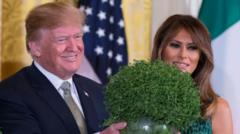Every March, the annual tradition of Irish politicians visiting Washington D.C. for St. Patrick's Day is accompanied by colorful festivities and heavy networking aimed at fostering business and political ties between Ireland and the U.S. However, this year, some Northern Irish leaders are opting out of the Washington trip due to disagreement over Donald Trump's policies. These events are critical for politicians who rely on face-to-face interactions to strengthen relationships and accomplish business goals, as emphasized by Steve Aiken, a key figure in previous Washington visits. Aiken remarked that while many perceive the trips as mere holiday excursions, they demand preparation, expertise, and engagement.
Máirtín Ó Muilleoir, a former Sinn Féin politician, highlights the significant positive climate in the U.S. around St. Patrick's Day, which creates a backdrop advantageous for Irish political pitches. The tradition of presenting a bowl of shamrock, initiated to smooth relations post-World War Two, continues as a symbolic gesture that underscores the importance of maintaining ties between both nations.
While acknowledging that such visits contribute to U.S. investment in Northern Ireland, experts caution against attributing direct economic success solely to these political engagements. Nevertheless, a collection of U.S. firms in Northern Ireland has notably increased over the years, suggesting a relationship wherein these visits serve as a catalyst for further economic opportunities.
As the current political climate poses challenges—as seen with Sinn Féin's decision to boycott the trip—politicians must carefully consider the wider implications of participating in or abstaining from these annual events, balancing the value of representation in Washington alongside the prevailing political sentiment in both the U.S. and Ireland.




















